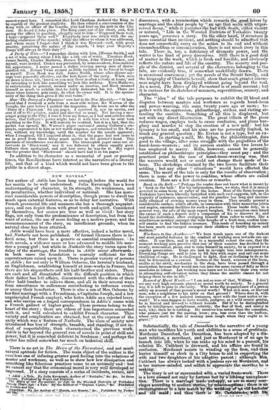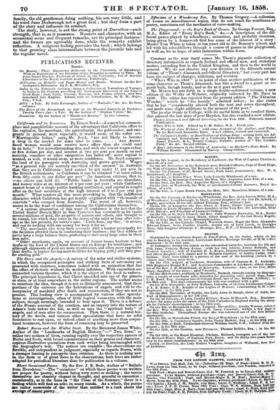NEW xovtLs.* Tan author. of Adele has been long enough
before the world for her merits to be well- andersod. Julia Kavanagh has a keen uuderatanding of character; in its strength, its weaknesses, and Its peculiarities, whether individual or national. She has more- over considerable powers ,of :description, though prone to dwell too much upon external features, so as to delay her narrative. With French provincial life and- manners she has a thorough acipiabat- ancc and can depict them with great truth and spirit. Considered by diemselves, her scenes are true as Well as vivid : her Story flags, 'not only from the predominance of description, but from the want of action, the use of mere feeling as a motive power,-and the recommeneement of the story, on insufficient grounds, when its nattirar close has been attained. -Adak would have been -a more effeetive, indeed a better novel, had Nathalie not been published. Of formal likeness there is in- deed none, hut there is a generic or essential resemblance. --- In both novels, a widswer more or less advanced to middle life mar- ries' a younegirr; but while in Nathalie the story turns upon -the delay of the marriage; the troubles in Addle occur afterWards : in both eases' the the foundation is scarcely sufficient for the superstructure raised, upon it. - There- is greater Variety of persons in Addle; for not only is William Osborne, the heroine's husband, an Englishman, establishing himself at iron-works in France but there are his stepmothers and: his half-brother and sisters. These are each and all dissatisfied with the difficult position in which. their father has left ,affairs, : discontented with the efforts of their elder half-brother to relieve them, and all in their several ways from smcotimess to sullenness contributing to influence events or annoy their benefactor. There is also a son of Mrs. Osborne by herfirst marriage with a Trench-mimics Capitaine Joseph, and a lbw unpriuciplecl'French employe, who hates Adele as a rejected lover, and who carries on a forged correspondence in .Adele's name with a- French gallant of higher grade.' These persons belong to the heart of the ; there are' others of less importance connected with it, and well, calculated to exhibit French character. Thus Variety and complication are obtained, but at the expense of the unity -which Was a feature of-A-Oho/ie." The class of society now ititrodieed has lest of Strength, breadth, and standing, if not in7 deed of respectability, than characterized the preview.; work. Adele is far-beyond the general run of' novels in point of skill and power; but it is sonaeWhat deficient in freshness ; and Perhaps the writer has relied somewhat tee much on technical skiTh
,
There is no art in The Heirs of _the Farmstead, and not much natural aptitude for fiction. _ The main object of the anther is the excellent one of infusinggreater good-feeling inter the relations of master and workman; as well as to show, how low diasipa-tion and sorbething like felonious practices 'come te an untimely 'end: but We Cannet say that the economical-moral is very weil'Invelopecl or impressed. .,If a_ story consists Of a series of incidenteseenes, and : .4-4414r s ..irin,Ikei brit'vtagh, Author of '' Nathalie," *c..s.r..c. In three -Ipirot, ‘047teeitt Artef, ,Htfitret, Itkett. ._ ; : . „., ft A ristWied 46 tfe In the Wprstiejt Darner* ?tlf , rOkshare r'rentY iiiit * Itibrate —244tel -tailor of "ItDithied TYpton,'"49ti. tPublished
II Heaton and Bow,
aptIgliff'11!49,4kesbiqffi CIYAuV''' 14,1ftte::..Ac'ityr:MtPq'ed bl,. , um; 10 esiobsee %MT?. sin Eivl bile , COS:419b ,b1114 11'...i. , ..,1!5ILI, discourses, with a:termination which„.rewards,* AvefUtiverlahy Marriage and 'the older people by ". an age. thatMoitif-Vth ceived decay," while it punishes the bad ivith deatli,'.eitlikViolent or natural, " Life in the Worsted .Districts of Yorkshire 'tivent years ago," possesses a story. On the other hand; if structure more essential thmn incident, and nothing should be admitted tha
deea not connectedly Carry on action to its end and Withont eirminthendilmis or cireumlocutien; there is not much story in this
; There is., toe, a deficiency of dramatic power,„ and th§ writer tic) fond of prosy discourses. Still there is goad &old of 'matter in the work, which is fresh and forcible, and obviously reflects the nature and life of the _country. The scenery and-peo- ple of the district, anct,several ef the characters belongin g to the tale, are evidently true, if somewhat unskilfully' drawn. There is occasional coarseness ; yet the novels of the Bronte family, and the biography of Charlettelierself,. thew thatinitch greater coarse- ness might have been displeYed without going beyond the real. As a novel, l'lee Heirs of the Farntslead is of small accolint ; but it is curious for its sketches of mannera, inperstitions, Scenery, and character, , The " idea" of the tale purposes to exhibit the ill blood and disputes between masters and workmen as regards hand-loom and power-weaving,' 'rife sonie. enty years ago r moreto- gether with the:oppression, philanthropy, strikes, and rioting at-, tending the eontests. Sotnething of all this' is displayed, but not with any :direct illustration. The great Villain of the piece reduces wages employs toOli. to cause' eoriftision; and plans -bur- glary and murder to stop 'the erection of. a nett- mill: but Ins tyranny isle° small, and his aims are tee personally limited, to touch any. general questioa; Mr. Erri,p1t is not a type, but an elc- Ception. In starting a..mill, Mr. SylEes, the philanthropist, do-os good to the village, after some struggle with the prejudices orthe hand-loomweavers ;, and its success enables the two lovers he has employed to marry. Mills, however, cannot be generally established- on philanthropic principles—they must pay ; and the practical: -point in the ease- of hand-loom-weaving was, that the 'weavers Would, not or could not change their- mode' of It- boar. The clerkships obtained by the two lovers facilitate their settling ; but any other "situations" :cyanid have effected the same. The merit of the tale is only for the results of observation,; there is none of the power to combine, whose effects are called creation. Here are a few sketches or 'remarks.- Bank in the Balk.— l'erhape the reader does not know what is meant a bank in the balk.' For his information, then, _we state, that it is money secreted in souse M e beam or rafter of the house. ost of the farm-houses in Yorkshire havebeen liberally furnished with such roof-supports, left, in the majority of instances, unconcealed and the practice has long and 'success- fully obtained' of stowing money away in them. Theynsually present' a considerable surface; which affoeds; in connexion with their numerous joints and angles, amazing facilities for such is practise. These banks defy, in a general way, the arts of the most expert burglars. 'We ourselves once heard the owner.of such ,a deposit defy a cothpamon of his to discover it ; and heard the individual; after swinging himself from rafter to rafter, like a mischievous monkey amongst 'the vide boughs of a fruit-tree confess him- self unable to find the hidden treasure. This mode of hoarding up money has been much encouraged amongst their children by thrifty fathers and
Pr.tliVre.! .
Workmen.to One ,Anothe?..— We here touch upon one of the darkest and most painful features in the eonduet of working men towards one an- other. It well them_ arid is still to a mournful extent the ease, that the moment Working men perceive that one-. of 'their number Ints decided to be steady; ace-I:Minitel, pious and to raise lanneelf in society, he is exposed 'kis regular -persecution. 'Traps are laid to inveigle him into intemperate*. Provoking things are said to him to fa him with anger and call out soups ebullition of rage. lie is challenged to fight, that on declining to do so he may be denouneed as a coward.' Sorters at the board, weavers at the loom, smiths at the anvil, 'mechanics in the shop, have been passed through' a martyrdom because they would not run into the same excess of folly as their associates * labour. ',et :working men learn, not to- hinder their own order in attempting:self-elevation before: they blame the middle closes fer--net helping, themtp,rise in life." ,
, .
_Reward of Moral Irot44.—".I am.not so sure of that, 'William. see any very high estimate pieced on moral worth by society. In 'a general way it is left to pine in Obeeurity; ' Who seeks the acquaintance of a pericin solely On 'aer,oiant. of that person's moral worth? What rich man' or learned man, asks a neighbour to his table on that ground ? Where does it, with the exception of a few isolated instances, meet with the least notice or Se- ward? If a man happen to have wealth, pedigree, er a wild erratic geiiitts, he is feasted and fawned to without bounds. But if he be distingiuslied only by intelligence; uprightnets, Sobriety; the *air of-Pod, and mercy to men/why,- then he is nothing. He reeeivestess notice than the comedian, , who pleases, just for the..passing hour; -yea, less even than the buffoon, . whose only merit is that of making. men 'laugh when they ought to be . grave " Substantially, the tale of Daunt/4/4'in the narrative of a young man who sacrifices his Youth and abilities'to a sense of gratitude. Mordaunt Daresford, the Dauntless, has been adopted by a
, Mat relation, a Merchant, and just as Mordasnit m of an age to
launch into 'life,' he can Mike to his mind to a ptitsnit, his relation Mr. 'Ciithbeitlis *droving,. and his :affairs are faiind'in confusion. Merdatint"iiiiiiate in winding u the Jinni:and-then buries himself as' clerk Ur' a City house to aid in supporting the Wife and two daughters Of 3iii'lltdOptive parent ; although Mrs. Cuthbert has slaty§ loOkSitivith a jealous eye on hfordaunt, awl is too narrow-minded and: selfish to appreciate the-. sacrifice-he is making.. The story is set or surrounded with, a varied framework. There is a lette Creased not 'only' hy'fortaiii but by a' lifelong naiexplana- ''bra is a raatiriage''iniiletirilapet at are ZO Many mar- riagell' encti and g tdrait'den/Wtbtit est 'ens theie is an 4'14E4 of 'cm old baohelor 3; "r that, an Itic-'0azisbniokeOrith 304, .970U1 esw t 11,,t
1 1
family, the old gentleman doing nothing, his son very- little, and his ward Jane Desborough not a great deal ; but they form a part Of the story and influence its conduct. The story, however, is not the strong point of Dauntless—such strength, that is, as it possesses. Manners and character, with an occasional scene and frequent remarks, are its principal features : and the former are agreeably done, while the remarks exhibit reflection. A religious feeling pervades the book ; which belongs to that growing class intermediate between the juvenile tale and the regular novel.



























 Previous page
Previous page